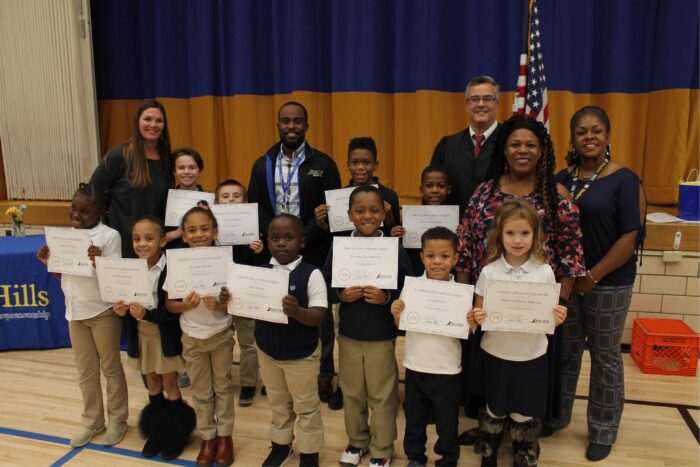PRESS RELEASE
Media Contact: Riva Richmond, rrichmond@microsociety.org
To Enhance Career Readiness Among Pittsburgh Youth, a Successful Entrepreneurship Program Moves Online
Three very different educational institutions are coming together this fall to develop an innovative career readiness program for Pittsburgh-area elementary school students, thanks to a generous $250,000 grant from the Richard King Mellon Foundation.
The Foundation has awarded the grant to MicroSociety Inc. (MSI), a Philadelphia education nonprofit, for a digital project with Penn Hills Charter School of Entrepreneurship (PHCSE) that will help prepare students in grades K-5 for the high-tech, high-skill workplace of the future through online society-building and mentorship by adult professionals. As part of the project, students majoring in entrepreneurship at Duquesne University’s Palumbo-Donahue School of Business will also mentor PHCSE students.
The three organizations fill different roles in the education world—an education model provider, a K-8 public school, and a university—but they are united by a common belief that the most powerful type of learning is hands-on learning through real-world experiences. They are also dedicated to instilling an “entrepreneurial mindset” in students that will prepare them for future career success, whether or not they become entrepreneurs.
“This project offers a multigenerational breakthrough in entrepreneurial education. By connecting youth with professional and secondary-student mentors online, we will be able to give our students in Penn Hills—and eventually at MicroSociety schools across the country and around the globe—a window into the world of business and entrepreneurship that is truly cutting-edge,” said Carolynn King Richmond, the president and CEO of MSI.
“We are excited to expose more youth and educators in the Greater Pittsburgh region to entrepreneurship. MicroSociety has been the cornerstone of our highly successful entrepreneurship education program, and we are thrilled to enhance this learning model by engaging Duquesne University to integrate a dynamic K-16 mentorship component,” said Dr. Wayne Jones, CEO of Penn Hills Charter School of Entrepreneurship.
Since 2011, PHCSE has used the in-person MicroSociety model to teach entrepreneurship and leadership to students in grades K-5. Daily, its students start and run real businesses like “Mad Science Labs” and “Fuzzy Pets.” They also operate their own bank and government, including a legislature and court for settling disputes.
Students who operate MicroSociety businesses learn how to hire, train, and, when necessary, let go of employees. Students who prefer not to start their own ventures or hold public office can seek work from classmates who need employees to make their ventures or government agencies function. All students develop resumes and learn how to interview for and hold jobs.
Under this project, PHCSE will pilot a new online platform from MSI called “MicroSociety 2.0,” that will enable MicroSociety activities to happen anytime, anywhere. MicroSociety 2.0 will give students the freedom to participate from home, at their own pace, and to invite students from other schools in the Pittsburgh region to participate in MicroSociety activities. The platform will also enable students to connect with community-partner mentors and Duquesne University fellows, to effectively expand PHCSE’s instructional capacity.
“We were keen to be the university partner for this exciting project for several compelling reasons,” said Dr. Dean McFarlin, Dean of the Palumbo-Donahue School of Business at Duquesne University. “One of our learning goals as a business school is to instill an entrepreneurial mindset in every student we touch, something that aligns very well with the visions of both PHCSE and MicroSociety Inc. In addition, creating education pathways that give students at schools like PHCSE learning opportunities through our strong university-level entrepreneurship program is a proverbial win-win for everyone.”
The project’s timing could not be better. When the pandemic forced Pennsylvania’s schools to close in March 2020, PHCSE had to scale back MicroSociety and pause its effort to recruit professional community partners to mentor students because these initiatives did not transition online easily. That experience proved to PHCSE’s leadership that virtual learning was a necessity, not just an option, and that career readiness must also be honed through online platforms.
With MicroSociety 2.0, students will be able to develop their own online business ventures and operate an online bank to create a cashless society. Candidates running for office will be able to advertise and market their campaigns using the online platform, and citizens will be able to contact their government. This undertaking will provide students with exciting new opportunities to build technology skills and experience a broad range of careers while improving the academic, social-emotional, and business-relevant skills they need to achieve economic mobility in the 21st Century.
Community leaders and area entrepreneurs visit the school throughout the year to teach professional skills to students, answer questions, and advise them on strategic planning. With the arrival of MicroSociety 2.0, PHCSE expects to partner with many more business leaders—local, national, and even global. Companies and government bodies interested in volunteering to mentor students in their ventures and agencies are encouraged to contact partnerships@phcharter.org.
About MicroSociety
MicroSociety Inc. (MSI) inspires and empowers K-8 students by providing compelling real-life learning opportunities through the creation and operation of miniature societies. A nonprofit consulting organization founded in Philadelphia in 1991, MSI supports schools and out-of-school time programs in the launch and effective implementation of the MicroSociety educational model by providing professional development, curriculum, and other services. Our kid-sized societies, held during part of the school day, enhance academic lessons and provide platforms for young people to develop into leaders, entrepreneurs, creative forces and confident citizens. They also generate intrinsic motivation to do well academically because students understand school is key to their success. Visit: www.microsociety.org. Follow us on Facebook, Instagram, Twitter, YouTube and LinkedIn.
About Penn Hills Charter School of Entrepreneurship
The Penn Hills Charter School of Entrepreneurship (PHCSE) is the only K-8 public school in Pennsylvania with a core focus in entrepreneurship education. PHCSE provides a hands-on, engaging program designed to bring entrepreneurial and economic concepts alive for students. Entrepreneurship concepts are integrated in core lessons related to English Language Arts, Mathematics, Science, and Social Studies. Visit: www.phcharter.org
About Duquesne University
Founded in 1878, Duquesne is consistently ranked among the nation’s top Catholic universities for its award-winning faculty and horizon-expanding education. A campus of nearly 9,500 graduate and undergraduate students, Duquesne prepares students by having them work alongside faculty to discover and reach their goals. The University’s academic programs, community service, and commitment to equity and opportunity in the Pittsburgh region have earned national acclaim.
It’s time for bigger goals. Follow Duquesne University on Facebook, Twitter, Instagram and LinkedIn. www.duq.edu
About Richard King Mellon Foundation
Founded in 1947, the Richard King Mellon Foundation is the largest foundation in Southwestern Pennsylvania, and one of the 50 largest in the world. The Foundation’s 2020 year-end endowment was $3.1 billion, and its Trustees in 2020 disbursed $130 million in grants and Program Related Investments. The Foundation focuses its funding on six primary program areas, delineated in its 2021-2030 Strategic Plan. Visit: www.rkmf.org.


